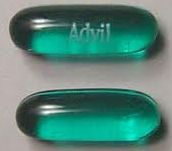Advil Liqui-Gels Interactions
There are 423 drugs known to interact with Advil Liqui-Gels (ibuprofen), along with 11 disease interactions, and 2 alcohol/food interactions. Of the total drug interactions, 101 are major, 306 are moderate, and 16 are minor.
- View all 423 medications that may interact with Advil Liqui-Gels
- View Advil Liqui-Gels alcohol/food interactions (2)
- View Advil Liqui-Gels disease interactions (11)
Most frequently checked interactions
View interaction reports for Advil Liqui-Gels (ibuprofen) and the medicines listed below.
- albuterol
- Aleve (naproxen)
- amlodipine
- amoxicillin
- aspirin
- atorvastatin
- Benadryl (diphenhydramine)
- Claritin (loratadine)
- clonazepam
- cyclobenzaprine
- doxycycline
- Fish Oil (omega-3 polyunsaturated fatty acids)
- gabapentin
- levothyroxine
- lisinopril
- losartan
- magnesium oxide
- melatonin
- metformin
- omeprazole
- pantoprazole
- prednisone
- tramadol
- trazodone
- Tylenol (acetaminophen)
- Tylenol Extra Strength (acetaminophen)
- Vitamin B12 (cyanocobalamin)
- Vitamin C (ascorbic acid)
- Vitamin D3 (cholecalciferol)
- Zyrtec (cetirizine)
Advil Liqui-Gels alcohol/food interactions
There are 2 alcohol/food interactions with Advil Liqui-Gels (ibuprofen).
Advil Liqui-Gels disease interactions
There are 11 disease interactions with Advil Liqui-Gels (ibuprofen) which include:
- asthma
- fluid retention
- GI toxicity
- rash
- renal toxicities
- thrombosis
- PKU
- anemia
- hepatotoxicity
- hyperkalemia
- platelet aggregation inhibition
More about Advil Liqui-Gels (ibuprofen)
- Compare alternatives
- Pricing & coupons
- Reviews (25)
- Drug images
- Latest FDA alerts (14)
- Side effects
- Dosage information
- During pregnancy
- Drug class: Nonsteroidal anti-inflammatory drugs
- Breastfeeding
Related treatment guides
Drug Interaction Classification
| Highly clinically significant. Avoid combinations; the risk of the interaction outweighs the benefit. | |
| Moderately clinically significant. Usually avoid combinations; use it only under special circumstances. | |
| Minimally clinically significant. Minimize risk; assess risk and consider an alternative drug, take steps to circumvent the interaction risk and/or institute a monitoring plan. | |
| No interaction information available. |
See also:
Further information
Always consult your healthcare provider to ensure the information displayed on this page applies to your personal circumstances.


